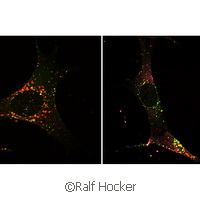Putting the brake on autophagy
Stress affects the body, and cells are not immune from it. During such times, cells digest their own parts and recycle them for metabolism. Experts call this process autophagy, which means 'self-eating'. It is the breakdown of cellular components that guarantees the cell's survival during starvation because cellular energy levels are maintained. Regulated autophagy ensures the synthesis and recycling of cellular components. Scientists in Germany have found that autophagy is regulated by a 'molecular brake', ensuring control is not lost. The finding was presented in the journal Cell Death & Differentiation. Cell processes occur only when they are needed; they stop when the need ends. 'Inside the cell, there exists a network of molecules,' said Professor Ingo Schmitz from the Helmholtz Centre for Infection Research (HZI) in Germany. 'Between them, information is constantly being exchanged. In a way, it looks like a big city subway map.' The researchers probed the various stops along the way, which is no easy task. Information obtained from this journey would help scientists decode the molecules that play a part in signal transduction processes. It would also give them the tools to shed light on diseases that result from defects in these 'information highways', according to the team. In this study, the researchers examined how larger-sized cellular components destined for degradation and recycling are enclosed within a small bubble, what experts call the autophagosome. The autophagosome fuses with another small bubble, kick-starting the digestion of the autophagosome's contents. 'Autophagy is a survival mechanism to ensure that the cell is able to obtain the necessary nutrients during times of starvation,' said Professor Schmitz. The team stained specific molecules and autophagosomes within cells to get a close look at which molecules regulate the formation of the digestive bubbles. The cells were either starved or simulated with an infection to begin self-digestion. They discovered that cells simultaneously also turned on autophagy-inhibiting molecules, 'like some kind of emergency brake that ensures autophagy doesn't get out of control', the scientists said. During their search, the researchers found that the protein p38 affects the process. While p38 is usually located inside the nucleus where it gets switched on during a stressful event, the team found it on the surface of the autophagosome. When the p38 is on the surface, it changes the Atg5 molecule, effectively blocking the final step of autophagy. The small bubble is created, inhibiting autophagy. The cells pulls the molecular emergency brake. Failure of the brake to set in would trigger disease. Co-author Ralf Höcker of HZI said the finding shows 'how important it is to tightly regulate autophagy'. Researchers from the University of Magdeburg, the Heinrich Heine University Düsseldorf and the Tübingen University, all in Germany, as well as Temple University School of Medicine in the United States contributed to this study.For more information, please visit: Helmholtz Centre for Infection Research (HZI): http://www.helmholtz-hzi.de/en/(opens in new window) Cell Death & Differentiation: http://www.nature.com/cdd/index.html(opens in new window)
Countries
Germany, United States



